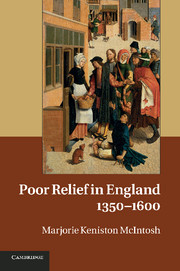Book contents
- Frontmatter
- Contents
- Acknowledgements
- Notes on conventions and online resources
- Abbreviations
- 1 Introduction
- Part I Late medieval and early Tudor patterns
- Part II Profound change during the early Reformation period
- Part III Intensified problems and altered approaches in the later sixteenth century
- 6 The burgeoning of begging, collection, and fraud
- 7 The changing nature of almshouses and hospitals
- 8 Support for the parish poor
- Part IV Responding to the problems
- Appendices included in the printed volume
8 - Support for the parish poor
Published online by Cambridge University Press: 05 January 2012
- Frontmatter
- Contents
- Acknowledgements
- Notes on conventions and online resources
- Abbreviations
- 1 Introduction
- Part I Late medieval and early Tudor patterns
- Part II Profound change during the early Reformation period
- Part III Intensified problems and altered approaches in the later sixteenth century
- 6 The burgeoning of begging, collection, and fraud
- 7 The changing nature of almshouses and hospitals
- 8 Support for the parish poor
- Part IV Responding to the problems
- Appendices included in the printed volume
Summary
During the reigns of Mary and Elizabeth, poor relief within the parishes developed more fully. Of 119 parishes whose churchwardens’ accounts were used between 1554 and 1598, seventy-one (60 percent) reported some activity on behalf of the poor. Although statutes of 1555 and 1563 modified the foundational Edwardian legislation of 1552 in limited ways, and although acts of 1572 and 1576 created new institutions at the county level, the expansion in parish involvement with the poor derived not from new laws but rather from the concerns of local people. Churchwardens experimented with techniques for generating and awarding funds to their poorer neighbors, especially children, and they served as legal spokespersons for the parish, representing it at ecclesiastical visitations and in court cases involving assistance to the poor. We can rarely determine the full level of parish involvement, however, for in some churches the wardens worked alongside Collectors for the Poor, who submitted separate but highly perishable accounts.
Collectors for the Poor have received no more than passing mention in previous studies. The sources used here show that Collectors were at work in 208 parishes by 1598, a number that is probably a small fraction of the total number. Their duties were complex, time consuming, and capable of creating ill-will. Perhaps in consultation with the churchwardens and minister, they had to decide which parishioners would contribute to the poor on a regular schedule, and in some parishes they imposed fixed assessments that might be resented or resisted. The Collectors were to report anyone who refused to pay to the churchwardens, who would in turn ask for the help of the bishop or Justices of the Peace (JPs) in forcing them to contribute. The Collectors also determined which parishioners should receive assistance and how much they should get, probably requiring visits to their homes to assess the level of need. Their decisions involved subjective value judgments about an individual’s or family’s sources of income, ability to work, and the reasons for poverty: whether the result of circumstances outside their control or due to their own idleness or wastefulness. In many parishes early in Elizabeth’s reign and in smaller parishes even later, the assistance given by Collectors might be limited to short-term help for people with particular problems, similar to the aid given by churchwardens. Increasingly, however, Collectors moved towards ongoing weekly payments for a subset of the poor deemed unable to support themselves. In addition to distributing the money, Collectors had to submit written accounts every quarter and sometimes carry out tasks normally assigned to the churchwardens, including pursuing legal action on behalf of the poor. It is no wonder that men tried to avoid an office that brought no pay and little prestige in return.
- Type
- Chapter
- Information
- Poor Relief in England, 1350–1600 , pp. 225 - 270Publisher: Cambridge University PressPrint publication year: 2011



